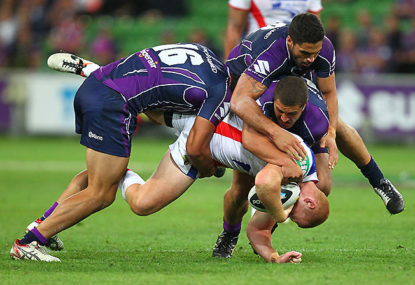I don’t have free-to-air television. In my peripatetic existence, if I can’t watch it on an iPad or laptop, I can’t watch it at all. So all I’ve seen of the Alex McKinnon interview is what’s been replayed on news programs and what’s on YouTube.
But I can tell you some things about the way the media works, and about a few trends in the mainstream media.
One point, raised on the radio last Sunday by the Storm’s ex-journo CEO Dave Donaghy, was about ‘focus’. The focus should have been on something else. Thousands agree with this.
Dave knows that’s not how it works. He knows that news is stuff that’s new (sorry if you’ve heard this before from me). In this regard, the media does not behave like a bunch of individuals, it’s like a tide coming in and out (I know, I’ve used that before, too).
So, if McKinnon makes the comments he made and 60 Minutes simply report them and focus on something else, then their rivals will be highlighting those comments before the program is even over. AAP and News and Fairfax would have stories about the comments up on their websites in minutes.
Channel Nine would be scooped by everyone on their own story, which they paid for. Not gonna happen.
I am often reluctant to judge my colleagues (what gives me the right, what do I know, who the hell am I etc.) but I believe 60 Minutes erred badly by not giving Cameron Smith the right of reply.
In saying that, I would like to explain a common, but complex, situation that reporters often find themselves in as part of this era of spin and message control. It was a problem 20 years ago but is almost ubiquitous now.
By going to someone for their reaction and fulfilling your ethical obligation, you often surrender all competitive advantage. Smith and his club, the Melbourne Storm, could possibly have made the decision to take control of the message when Smith was approached, by putting out a media release contesting McKinnon’s quotes before anyone had heard them.
Once more, Channel Nine’s investment in their biggest story of the year is completely blown. They may as well have not done the interview at all.
Of course, if you are about to be portrayed badly by someone, you do not feel any obligation to simply defend yourself as asked, then shut up and wait for the likely hatchet job to appear.
It’s called ‘the front foot’. But if you get on the front foot this time, on the next occasion someone says something unkind about you, a reporter is going to think twice about giving you the right of reply.
Consumers often overlook that fact that competition is what gets news organisations into print and on the air each day – without it, nothing gets covered properly at all, no-one has a job.
As I said, I still think Smith should have been consulted, regardless of the competitive factors at play. So where should the line have been drawn?
Here’s where I draw it. If there is a low probability of a story being blown, always go for every possible alternative viewpoint.
If, however, there is a high probability of a story being devalued by someone who does not like what you are about to report and who will do his or her best to soften the blow before it comes out, then I would decide what to do based on this criteria.
If no reputation is being impinged by the claims – if it’s just a case of ‘I did this’, ‘this happened’, etc. – then present these as just that, claims. Make sure they are sourced to the person making them and don’t suggest to the reader or listener that you necessarily believe or disbelieve them.
But publish, or broadcast. No-one is going to be hurt. No reputations are being damaged and giving your opposition a free kick would not make sense.
However, if someone is going to have their reputation impinged by the claims, if the comments or allegations involve another person and paint them in a poor light, you really have no alternative than to provide them with the right of reply.
In this situation, ethics trump commerce or competition.
Having said all that, I have probably made poor decisions in this area myself in the past. It happens. Someone reading this may have been sullied by a story I wrote without checking in with them.
I recall in 2010 in Jacksonville, a group of Jamaican players claimed to have witnessed a gunfight involving police while travelling around town. Great story, right? On-the-record quotes. No-one defamed.
But local rugby league officials were horrified. They called the police who said they had no knowledge of any such incident. They were concerned Jacksonville would get no more major rugby league events as a result of the negative publicity.
Even when you think no-one will be hurt by a story, someone often is. Your absolute obligation is to get it right, and to never knowingly quote someone telling an unchallenged lie. Of course, I shouldn’t have trusted the players – I should have called the cops myself. To this day, I don’t know what really happened.
What has happened here is just sad and unfortunate. I am not aware of the veracity of recent claims about discrepancies in the audio presented to McKinnon and what actually occurred at the ground.
But this is no workaday rugby league soap opera. I don’t feel the same compelling desire to take sides which seems to have overcome everyone else.
I’d do things differently if I had that night last April over again – and so would Cameron, I’m sure.





























































































